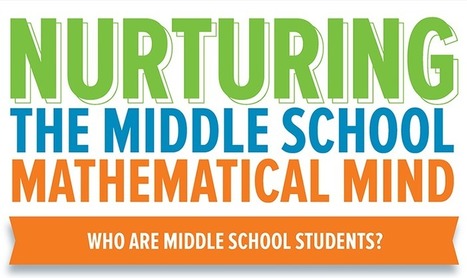The middle school mind is…different.
As 13-year-old Logan LaPlante described in his Ted Talk Hack Schooling Makes Me Happy, “Neuroscientists say that the teenage brain is pretty weird: our prefrontal cortex is underdeveloped, but we actually have more neurons than adults, which is why we can be so creative, and impulsive, and get bummed out.” Truer words were never spoken around this subject.



 Your new post is loading...
Your new post is loading...










How different is the mind of a middle school learner? This infographic is divided into the following sections:
* Who are middle school students?
* How do they learn?
* How can you teach to reach them?
* How can we change that statistic?
There is also a white paper that you can receive a copy of (although you will need to provide your contact information). The white paper, Nurturing the Middle School Mathematical Mind, will provide additional information.